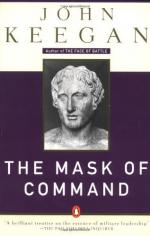
|
| Name: _________________________ | Period: ___________________ |
This quiz consists of 5 multiple choice and 5 short answer questions through Part 2, Chapters 1-9.
Multiple Choice Questions
1. Even with _________________ soldiers, Darius was unable to outsmart Alexander, who perfectly executed a plan to attack Darius from the rear rather than wait to face the ruler head on at Cilicia.
(a) 1,400,000.
(b) 140,000.
(c) 14,000.
(d) 1,400.
2. Olympias and Philip were a good match - passionate, loving, and committed by _____________________.
(a) Choice and an arranged marriage.
(b) Choice, not by an arranged marriage.
(c) Mutual hatred of the Persian emperor.
(d) An arranged marriage, not by choice.
3. In 1806, Wellington realized what dream?
(a) Of graduating from college.
(b) Of being married.
(c) Of becoming a military leader.
(d) Of being accepted by his military peers.
4. Wellington had first witnessed warfare in _________ in Holland.
(a) 1497.
(b) 1794.
(c) 1749.
(d) 1479.
5. When did Wellington come alive in his military career?
(a) After his military stint in India.
(b) After the Battle of Waterloo.
(c) Before his military stint in India.
(d) While in military school.
Short Answer Questions
1. Aristotle would become known as one of the world's most brilliant philosophers and the founding father of ___________.
2. ___________________, a contemporary of Wellington's from Calcutta, described the man thus: "He was all life and spirits. In height he was about 5 feet 7 inches (in fact nearer 5 feet 10 inches) with a long pale face, a remarkably large aquiline nose, a clear blue eye and the blackest beard I ever saw" (p. 106).
3. Many of the soldiers were considered to be ___________ by Alexander.
4. The first piece of news about Napoleon's attack on the Prussians reached Wellington while he was preparing to do what?
5. Technically, the victory in battle meant that Alexander was now what?
|
This section contains 281 words (approx. 1 page at 300 words per page) |

|




